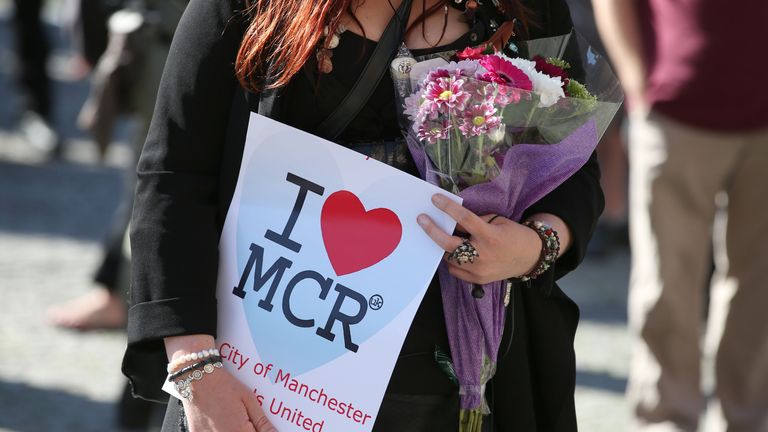Manchester Arena bombings: Attackers 'did not act alone', inquiry hears
The British Transport Police said that despite security services knowing about Abedi, they did not have any intelligence on him.
Tuesday 29 September 2020 22:06, UK
The brothers who attacked Manchester Arena "did not act alone" and others who knew about the bomb plot are still "at large", the public inquiry has heard.
It was "obvious" that suicide bomber Salman Abedi and his brother Hashem had help for the attack, according to Patrick Gibbs QC, who is representing the British Transport Police (BTP).
"But what of the other potential murderers, we don't yet know their names," Mr Gibbs told the inquiry.
He talked about the "intricate and lengthy and carefully planned preparations" of the Abedi brothers, which were detailed earlier in the inquiry and during Hashem Abedi's trial.
"They must have received technical help and financial help and training and support from other people.
"Other people must have known, or at least suspected, what they were up to and those other people are at large."
Mr Gibbs added that the BTP had no intelligence about Abedi, despite him being known to the security services and counter-terrorism police.
The inquiry was also told by the ambulance service, which did not send a paramedic in to treat victims at the scene of the attack, it provided a "quick, effective and adequate" response to the attack.
The North West Ambulance Service (NWAS) said in an opening statement that it only completed triaging victims of the attack in the City Room, where the explosion took place, an hour after the attack.
Treatment of victims took place on the nearby Victoria Station concourse but patients had to be carried to the "casualty clearing station" on makeshift stretchers made from advertising hoardings and metal barriers by police officers and members of the public.
The inquiry has heard that police entered the City Room within minutes of the explosion and were asking on the radio for paramedics to be sent in.
But Lisa Roberts QC, representing the ambulance service told the inquiry: "NWAS is currently of the view that the majority of its response to this incident was good.
"Overall operational response to the attack was quick, effective and adequate."
The first member of the ambulance service only arrived at the scene 18 minutes after the explosion, and he had "self-tasked" after following a police car.
One of the 22 victims of the Manchester Arena bombing may have survived his injuries if he had not waited more than an hour for medical treatment, the inquiry has previously been told.
John Atkinson, 28, suffered a heart attack an hour and 17 minutes after the blast when he suffered blood loss from leg and abdominal wounds.
Ms Roberts did not name Mr Atkinson, but told the inquiry: "The experts commissioned by the inquiry to consider the likelihood of survivability have concluded that the injuries of all but one person were unsurvivable with current advanced medical treatment even if speedier admission to hospital had taken place."
The "wellbeing and safety of frontline responders" was a factor that "always has to be considered" to ensure they can continue to operate, Ms Roberts told the inquiry.






